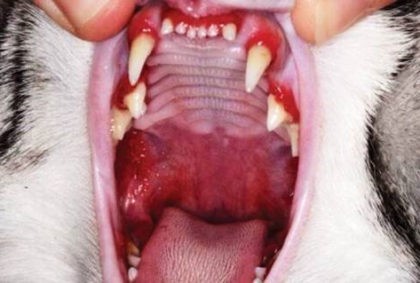
Juvenile gingivitis is typically diagnosed between 6 and 12 months of age. In cases like Thomass where periodontal disease and dental mobility had set in molar and premolar.

Cats with severe gum problems may require an over-the-counter product made with chlorhexidine a stronger antibiotic.
Cure for gingivitis in cats. Get your cat comfortable with the toothbrush. Put some toothpaste onto the brush and have the cat lick it off reward with a treat. When your cat is comfortable with you touching his or her mouth and is familiar with the toothbrush and toothpaste gradually switch to putting the toothpaste on your finger and then to putting the toothpaste on the toothbrush.
With a system based on surgical removal of plaque daily oral hygiene and the use of medications as prescribed by your veterinarian you will get your feline back to normal in no time. If you want to read similar articles to How to Treat. Most cats need a few dental cleanings during their lifetime.
More recently we are looking at novel therapeutic approaches for the treatment of gingivitis. This interesting study which was published in 2020 looks at the use of canine interferon alpha for. The medical approach to feline gingivitis varies.
Severe cases dont seem to have a lot of alternatives to tooth extraction. In cases like Thomass where periodontal disease and dental mobility had set in molar and premolar. Two natural ways to prevent cat gingivitis.
The first thing any natural health professional will try to do is restore a healthy immune system in your pet. Once balance is established in the whole system everything else will slip back into a natural order including your cats dental health. Preventing Gingivitis in Cats.
Plaque control is by far the most effective means of preventing gingivitis in most cats with daily teeth brushing being the best method. Water additives chlorhexidine rinses and plaque-control treats. The Natural Solution To Gingivitis in Cats Offers The Best Prognosis.
Simply by addressing the diet which may or may not be straightforward it is possible to reverse this condition completely when it is in its early stages. It will help the advanced stages too although extra help is more often needed in addition. Presently there are multiple ways of treating cat gingivitis.
Relief from Discomfort Treatment Calming drugs non-steroid ought to be utilized undeniably joined with narcotics if the creature requires them. 1 spray every day in water or directly in the mouth. Stop when symptoms disappear.
Please follow the above dosages and instructions or as directed by one of our Health Advisors. A poor dental health routine. A poor dental health routine can often be the cause of gingivitis in cats.
As an owner you should make sure you have a good dental health routine set up to care for your cats teeth and decrease the chances that theyll suffer from a dental health issue. The ultimate veterinary treatment for cats with gingivitis is to have their teeth removed. Sometimes all the teeth are removed.
Not only is this draconian solution incredibly invasive and maiming to the cat it usually is very expensive for you. Juvenile gingivitis is a severe general inflammation in the gingiva in young cats. Onset of inflammation can be as early as the time of eruption of the permanent teeth.
There is a pronounced inflammation of the gingiva often followed by marked hyperplasia of the tissue. Juvenile gingivitis is typically diagnosed between 6 and 12 months of age. Cats with severe gum problems may require an over-the-counter product made with chlorhexidine a stronger antibiotic.
Schedule Cleanings Cats with chronic gingivitis especially those that dont take well to brushing will likely need more frequent dental cleanings at a veterinarians office every six to nine months rather than just annually. Your vet may also encourage the use of coconut oil for cat gingivitis which contains compounds that offer antimicrobial and anti-inflammatory benefits to periodontal disease. If gingivitis is advanced your vet may recommend antibiotics or other prescription medications to manage the disease andor the complications from it such as infections in the gums or teeth.
Home remedies for this result of gingivitis can be effective at washing bad odor away. A mixture of two tablespoons of warm water and 18 teaspoon of Ceylon cinnamon squirted into your cats mouth with an eye dropper will freshen her breath. What Is Gingivitis In Cats.
Gingivitis in cats is defined as inflammation of the cats gums. The term gingiva means gums which are the pink mucous membrane covering the bones of the upper and lower jaws surrounding the cats teethThe postfix itis means inflammation which is the redness soreness swelling heat and loss of function which is the. This might sound drastic but cats tend to do very well without their teeth.
Tooth surfaces provide areas for bacteria to attach removing the teeth can help control periodontal disease and minimize the bacteria that provoke the immune system in cats with stomatitis. Cats continue to eat and live very full lives without teeth. Stomatitis in cats is a syndrome that usually has three main components.
Severe gingivitis mouth ulcers and gum hyperplasia. Vets dont agree on a precise definition for this syndrome and there is not necessarily unanimous consensus on its. Gingivitis is the inflammation of the gingiva or gums.
In the early phases of gingivitis some plaque is present and there is a mild redness of the gums but the gingival surfaces are smooth. Plaque is the result of food debris bacteria dead skin cells and mucus that collects on the teeth. Plaque forms within 24 hours on clean tooth surfaces.
Homeopathic Remedies for Gingivitis in Pets. Internally homeopathic therapy may be of immense benefit. The key remedy undoubtedly Mercurius solubilis 30c given three times daily especially where the animals tongue looks heavily coated.